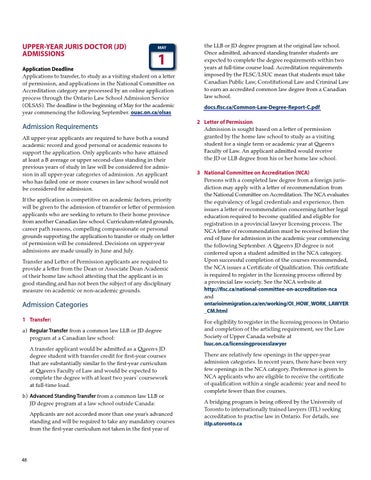uPPEr-yEAr juriS DoCtor (jD) ADmiSSionS
mAy
1
Application Deadline Applications to transfer, to study as a visiting student on a letter of permission, and applications in the National Committee on Accreditation category are processed by an online application process through the Ontario Law School Admission Service (OLSAS). The deadline is the beginning of May for the academic year commencing the following September. ouac.on.ca/olsas
admission Requirements All upper-year applicants are required to have both a sound academic record and good personal or academic reasons to support the application. Only applicants who have attained at least a B average or upper second-class standing in their previous years of study in law will be considered for admission in all upper-year categories of admission. An applicant who has failed one or more courses in law school would not be considered for admission. If the application is competitive on academic factors, priority will be given to the admission of transfer or letter of permission applicants who are seeking to return to their home province from another Canadian law school. Curriculum-related grounds, career path reasons, compelling compassionate or personal grounds supporting the application to transfer or study on letter of permission will be considered. Decisions on upper-year admissions are made usually in June and July. Transfer and Letter of Permission applicants are required to provide a letter from the Dean or Associate Dean Academic of their home law school attesting that the applicant is in good standing and has not been the subject of any disciplinary measure on academic or non-academic grounds.
admission categories 1 transfer: a) Regular Transfer from a common law LLB or JD degree program at a Canadian law school: A transfer applicant would be admitted as a Queen’s JD degree student with transfer credit for first-year courses that are substantially similar to the first-year curriculum at Queen’s Faculty of Law and would be expected to complete the degree with at least two years’ coursework at full-time load. b) Advanced Standing Transfer from a common law LLB or JD degree program at a law school outside Canada: Applicants are not accorded more than one year’s advanced standing and will be required to take any mandatory courses from the first-year curriculum not taken in the first year of
48
the LLB or JD degree program at the original law school. Once admitted, advanced standing transfer students are expected to complete the degree requirements within two years at full-time course load. Accreditation requirements imposed by the FLSC/LSUC mean that students must take Canadian Public Law, Constitutional Law and Criminal Law to earn an accredited common law degree from a Canadian law school. docs.flsc.ca/Common-Law-Degree-report-C.pdf 2 Letter of Permission Admission is sought based on a letter of permission granted by the home law school to study as a visiting student for a single term or academic year at Queen’s Faculty of Law. An applicant admitted would receive the JD or LLB degree from his or her home law school. 3 national Committee on Accreditation (nCA) Persons with a completed law degree from a foreign jurisdiction may apply with a letter of recommendation from the National Committee on Accreditation. The NCA evaluates the equivalency of legal credentials and experience, then issues a letter of recommendation concerning further legal education required to become qualified and eligible for registration in a provincial lawyer licensing process. The NCA letter of recommendation must be received before the end of June for admission in the academic year commencing the following September. A Queen’s JD degree is not conferred upon a student admitted in the NCA category. Upon successful completion of the courses recommended, the NCA issues a Certificate of Qualification. This certificate is required to register in the licensing process offered by a provincial law society. See the NCA website at http://flsc.ca/national-committee-on-accreditation-nca and ontarioimmigration.ca/en/working/oi_how_work_LAwyEr _Cm.html For eligibility to register in the licensing process in Ontario and completion of the articling requirement, see the Law Society of Upper Canada website at lsuc.on.ca/licensingprocesslawyer There are relatively few openings in the upper-year admission categories. In recent years, there have been very few openings in the NCA category. Preference is given to NCA applicants who are eligible to receive the certificate of qualification within a single academic year and need to complete fewer than five courses. A bridging program is being offered by the University of Toronto to internationally trained lawyers (ITL) seeking accreditation to practise law in Ontario. For details, see itlp.utoronto.ca
